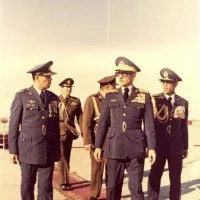Recent disagreements over Beijing’s claim to the South China Seas (in which a tribunal constituted under the UN Convention on the Law of the Sea issued a non-binding decision in July 2016 in favor of the Philippines) in many ways is reminiscent of the potentially far more serious clashes over the Taiwan Straits, the first of… Read More "China’s Fight for Tiny Islands — The Taiwan Straits Crises, 1954-58"
Mohammad Reza Pahlavi, the Shah of Iran, departed Tehran on January 16, 1979 to seek medical treatment and to escape growing political unrest in the country he ruled. The Shah had consolidated his hold on power after the 1953 U.S.-backed overthrow of Mohammad Mossadegh and was considered a vital ally to the U.S., a leader… Read More "Finale of the Persian Monarchy and Prelude to the Iranian Revolution"
Persistence, Vision and Luck: Creating a Center for Diplomatic Training
Can you imagine the bureaucratic struggles involved in persuading the Department of Defense to hand over acres of prime real estate for a State Department training facility and then convincing Congress to authorize the transfer? This impossible dream was accomplished thanks to vision, persistence and a large dose of luck by a small group of… Read More "Persistence, Vision and Luck: Creating a Center for Diplomatic Training"
Agent Orange and the Vietnam War
In 1961, United States forces in Vietnam began to use chemical herbicides and defoliants on South Vietnamese crops, bushes, and trees in order to deprive the Vietcong of both food and cover for ambushes. Code-named Operation Ranch Hand, the campaign used a variety of herbicides but the most commonly used, and most effective, was Agent… Read More "Agent Orange and the Vietnam War"
Observing the Fiftieth Anniversary of VJ-Day in Japan
How to commemorate an important anniversary of the country in which you’re posted when it marks a low point in the bilateral relationship? World War II came to an end when Imperial Japan announced its surrender on August 15, 1945; officials from its government signed the Japanese Instrument of Surrender on September 2 aboard the… Read More "Observing the Fiftieth Anniversary of VJ-Day in Japan"
Thailand’s Bloodless Coups d’état
When a country undergoes internal conflict and something as dramatic as a coup d’etat, the results can often lead to a dizzying shift in policies as well as an abrupt change in those who are in charge. In Thailand, the situation is different. The country has gone through 12 coups since 1932 (not counting a… Read More "Thailand’s Bloodless Coups d’état"
When Friends Spy on Friends: The Case of Jonathan Pollard
Former Navy intelligence analyst Jonathan Jay Pollard delivered over 800 highly classified documents to the Israeli government over a 17-month period. According to an article by Seymour Hersh published in the New Yorker, Pollard stole and sold militarily sensitive Signals Intelligence information, a year’s worth of memos by intelligence officers in the U.S. Navy’s Sixth… Read More "When Friends Spy on Friends: The Case of Jonathan Pollard"
Operation Storm — The Battle for Croatia, 1995
After the fall of Yugoslavia in the early 1990’s, the Balkans descended into a bloody ethnic and sectarian conflict. Although there were roughly six discrete Yugoslav conflicts, the first major war was the Croatian War for Independence. Starting in 1991, when Croatia declared its independence as a nation-state, the war was fought between forces loyal… Read More "Operation Storm — The Battle for Croatia, 1995"
Charlie Wilson’s Warpath
Congressman Charlie Wilson was a twelve-term United States Democratic Representative from Texas from 1973-1997 who was known by his (in)famous nickname “Good Time Charlie.” A self-proclaimed “ladies’ man,” Wilson embraced his hard-partying image, claiming that his constituents knew they were not electing a “constipated monk.” Despite his playboy persona, Wilson was known for his passionate… Read More "Charlie Wilson’s Warpath"
Jesse Helms: The Senator Who Just Said No
Jesse Alexander Helms, a five-term Republican Senator (1973- 2003) from North Carolina, was known not only for his conservative beliefs but for the lengths he would go in support of them. A proponent of the conservative resurgence movement in the 1970s, Helms cherished his nickname: “Senator No,” granted for his obstructionist tendencies. As a member… Read More "Jesse Helms: The Senator Who Just Said No"

